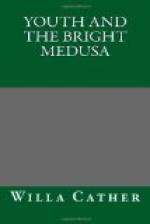Several weeks went by, and as Bouchalka did not reappear on Tenth Street, Cressida and I went once more to the place where he had played, only to find another violinist leading the orchestra. We summoned the proprietor, a Swiss-Italian, polite and solicitous. He told us the gentleman was not playing there any more,—was playing somewhere else, but he had forgotten where. We insisted upon talking to the old pianist, who at last reluctantly admitted that the Bohemian had been dismissed. He had arrived very late one Sunday night three weeks ago, and had hot words with the proprietor. He had been late before, and had been warned. He was a very talented fellow, but wild and not to be depended upon. The old man gave us the address of a French boarding-house on Seventh Avenue where Bouchalka used to room. We drove there at once, but the woman who kept the place said that he had gone away two weeks before, leaving no address, as he never got letters. Another Bohemian, who did engraving on glass, had a room with her, and when he came home perhaps he could tell where Bouchalka was, for they were friends.
It took us several days to run Bouchalka down, but when we did find him Cressida promptly busied herself in his behalf. She sang his "Sarka" with the Metropolitan Opera orchestra at a Sunday night concert, she got him a position with the Symphony Orchestra, and persuaded the conservative Hempfstangle Quartette to play one of his chamber compositions from manuscript. She aroused the interest of a publisher in his work, and introduced him to people who were helpful to him.
By the new year Bouchalka was fairly on his feet. He had proper clothes now, and Cressida’s friends found him attractive. He was usually at her house on Sunday afternoons; so usually, indeed, that Poppas began pointedly to absent himself. When other guests arrived, the Bohemian and his patroness were always found at the critical point of discussion,—at the piano, by the fire, in the alcove at the end of the room—both of them interested and animated. He was invariably respectful and admiring, deferring to her in every tone and gesture, and she was perceptibly pleased and flattered,—as if all this were new to her and she were tasting the sweetness of a first success.
One wild day in March Cressida burst tempestuously into my apartment and threw herself down, declaring that she had just come from the most trying rehearsal she had ever lived through. When I tried to question her about it, she replied absently and continued to shiver and crouch by the fire. Suddenly she rose, walked to the window, and stood looking out over the Square, glittering with ice and rain and strewn with the wrecks of umbrellas. When she turned again, she approached me with determination.
“I shall have to ask you to go with me,” she said firmly. “That crazy Bouchalka has gone and got a pleurisy or something. It may be pneumonia; there is an epidemic of it just now. I’ve sent Dr. Brooks to him, but I can never tell anything from what a doctor says. I’ve got to see Bouchalka and his nurse, and what sort of place he’s in. I’ve been rehearsing all day and I’m singing tomorrow night; I can’t have so much on my mind. Can you come with me? It will save time in the end.”




